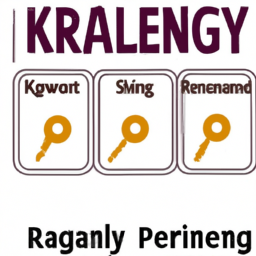Understanding Your Keyword Difficulty Range for SEO Success
Table of Contents []
- Keyword Difficulty Range
- What is Keyword Difficulty Range?
- Why is Understanding the Keyword Difficulty Range Important?
- How to Calculate the Keyword Difficulty Range?
- What Types of Keyword Difficulty Ranges Does SEO Have?
- What are the Benefits of Understanding the Keyword Difficulty Range?
- Conclusion
- Final Word
Keyword Difficulty Range
Exploring The Keyword Difficulty Range
When it comes to SEO, understanding keyword difficulty is the first step in a successful optimization process. However, this is easier said than done. In this comprehensive guide, we will provide an in-depth exploration of the keyword difficulty range and various related concepts.
We have identified 8 main themes around keyword difficulty range that will be discussed in detail. It is important to note that this article is directed towards experienced SEO professionals, but should also be understandable to those who are new to the field.
What is Keyword Difficulty Range?
The keyword difficulty range is the range of difficulty that exists in a keyword from the most difficult to the least. It is used to determine the difficulty of optimizing a particular keyword. This range can include anything from low, medium, and high difficulty keywords.
Essentially, when you are looking to optimize a keyword, you will need to determine its difficulty range. This will depend on a number of factors including the competition for the keyword, the amount of content available on the keyword, and the type of content available. This will give you an indication of what kind of optimization strategy you will need to adopt for the keyword.
Why is Understanding the Keyword Difficulty Range Important?
Understanding the keyword difficulty range is important because it can help you develop an effective optimization strategy. It will give you an idea of which keywords you should focus your efforts on and will help you avoid going after keywords that are too difficult to rank for.
For example, if you were to go after a high difficulty keyword, chances are you would not be successful. This is because there would be a lot of competition for the keyword and a lot of other websites would be vying for the top spot. Therefore, if you wanted to increase your chances of success, you would need to focus on keywords with a lower difficulty range.
How to Calculate the Keyword Difficulty Range?
Calculating the keyword difficulty range is not an exact science. However, there are some methods you can use to approximate the difficulty of a keyword. The most common method is to look at the amount of content available on the keyword and the number of backlinks pointing to the keyword.
You can use tools such as Moz and Ahrefs to measure the difficulty of the keyword. These tools can provide you with an estimated difficulty score, which will give you an idea of the competition for the keyword.
What Types of Keyword Difficulty Ranges Does SEO Have?
SEO has 3 main types of keyword difficulty ranges. These are low, medium, and high difficulty keywords. Low difficulty keywords typically require little effort to optimize, while high difficulty keywords will require more effort to rank for.
Low difficulty keywords tend to have less competition and have low keyword search volumes. Medium difficulty keywords will have moderate competition and higher keyword search volumes. High difficulty keywords will have high competition and high keyword search volumes.
What are the Benefits of Understanding the Keyword Difficulty Range?
Understanding the keyword difficulty range has a number of benefits. Firstly, it will give you an indication of the level of effort you need to put in to optimize a particular keyword. Secondly, it can help you focus your effort on the keywords that will have the highest return-on-investment. Finally, it can help you avoid wasting your time trying to optimize keywords with very high difficulty ranges as they are likely to be too difficult to rank for.
Conclusion
Understanding keyword difficulty range is essential for any successful SEO strategy. Knowing the difficulty range of a keyword can help you focus your efforts on the keywords that will give you the best return for your investment. We have explored the various aspects of keyword difficulty range in this article and provided an in-depth look at the different types of difficulty ranges, as well as the benefits of understanding them.
Final Word
In conclusion, keyword difficulty range is an important factor to consider when optimizing a website for better rankings in the SERPs. By understanding the keyword difficulty range, you can focus your efforts on the most profitable and achievable keywords.
Happy optimizing!

